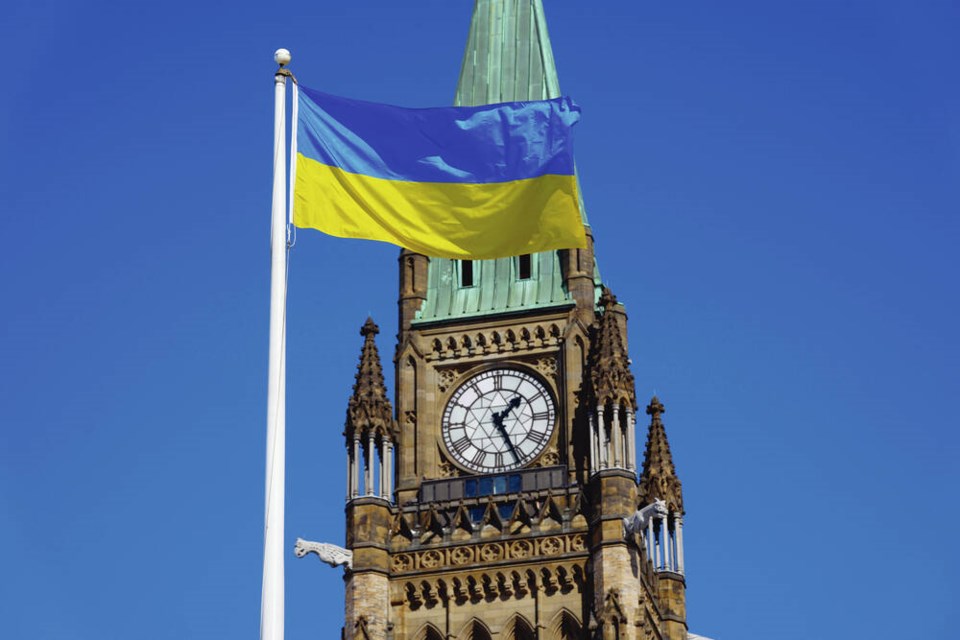A commentary by a student of Ukrainian-Canadian history, and former vice-president of the UVic Ukrainian Students’ Society.
Talk of anti-Ukrainian harassment on university campuses has spread across Canada in the past week, including in Victoria.
On Jan. 25, the UVic Ukrainian Students’ Society released a statement publicizing incidents of harassment towards its members that have increased since the Russian invasion of Ukraine.
Since then, other Ukrainian-Canadian organizations, such as the Carleton Ukrainian Students’ Club in Ottawa, have spoken up about related incidents.
With the UVic Ukrainian Students’ Society being the first to bring light to this issue, considerable attention has been put on the school and the community’s response. On Jan. 27, UVic president Kevin Hall announced an investigation.
In its statement, the UVic Ukrainian Students’ Society accused the local branch of the Young Communist League of Canada as the perpetrator of incidents it claims were harassment.
Members of the UVic Ukrainian Students’ Society have also identified individual Young Communist League members, as well as affiliated organizations like the Vancouver Island Peace Council, as enablers of this harassment and spreaders of misinformation about the war.
As a result, members of our community, some of whom are Ukrainian-Canadians themselves, have faced a week of accusations, threats, and comments that misrepresent their involvement in the incident.
Online, some have taken baseless claims so far as to suggest Young Communist League members were involved in an unrelated incident of arson at a Ukrainian family’s home in Victoria last April.
In truth, the Young Communist League’s involvement in what they are blamed for has been limited to political rhetoric, not harassment.
The group and its politically active affiliates are not related to the violent incidents that have been found in articles together with their names over the past week.
While these incidents are really the products of unidentified individual actors, that this conflict is being portrayed as an issue of politically progressive organizations is no coincidence.
Ukrainian-Canadians are diverse in political belief, and a look back into history shows that conflict between opposing factions of the Ukrainian-Canadian community is nothing new. A re-evaluation of who is being blamed, and why, is needed when understanding this story.
As with any group of people, Ukrainian-Canadians are not uniform. Two organizations, the Association of United Ukrainian Canadians on the left and the Ukrainian Canadian Congress on the right, have dominated the organized parts of this diaspora since the Second World War.
The Ukrainian-Canadian left-wing traces its history back over a century, to the first wave of Ukrainian immigrants to Canada and the founding of the Ukrainian Social Democratic Party.
It has a history filled with suppression by the Canadian government and close ties to the Communist Party of Canada and Soviet Ukraine.
The right-wing of Ukrainian-Canadian organizations exist under the umbrella Ukrainian Canadian Congress, which has held a conservative, anti-Communist, and pro-independence stance since its founding in 1940.
Throughout the Cold War, and especially since the fall of the Soviet Union, the Ukrainian Canadian Congress has grown to become the much larger of the two, now portraying itself as the voice of all Ukrainian-Canadians regardless of the truth of such a statement.
In addition to its cultural efforts, it remains a politically active organization, supporting Canadian foreign policy that promotes the making of a capitalist liberal democracy in Ukraine.
The two dozen Ukrainian student organizations found on campuses across Canada today, including the UVic Ukrainian Students’ Society, are part of the Ukrainian Canadian Students’ Union (SUSK), a member organization of the right-wing Ukrainian Canadian Congress.
Throughout this organization, a strict attitude against all things Communist persists.
Ultimately, rhetoric from a political group, especially one whose membership includes Ukrainian-Canadians, does not equate to the individual incidents of harassment that have actually occurred on campuses.
The Young Communist League, the Association of United Ukrainian Canadians, and others on the left have called for a ceasefire and peace in Ukraine since the war’s beginning and are not aligned with Russia just because they do not agree with Canadian foreign policy that supports Ukraine’s military.
These conflicts that merely pass blame around are a manifestation of a battle of political ideas within a larger, historical context.
Harassment indeed has no place on campus, and as UVic begins an investigation into the matter, the priority must be kept to the individuals actually targeting students rather than taking the convenient route of framing the victims’ political opponents.
>>> To comment on this article, write a letter to the editor: [email protected]



